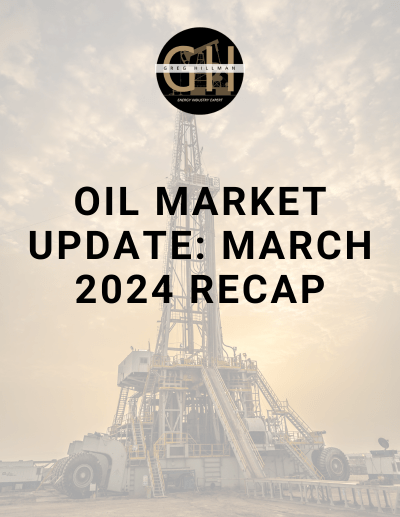As March bids farewell, the oil markets are closing out the month on a resilient note, driven by a recent surge in prices. The sustained rally, largely attributed to the OPEC+ output cuts, is poised to mark a quarter of gains for the benchmarks. Let’s delve into the key highlights shaping the oil landscape:
OPEC+ Cuts and Market Confidence
Investor confidence in the efficacy of OPEC+ production cuts is reaching new heights. This trust, coupled with a promising macroeconomic outlook, has sparked discussions of oil potentially hitting the $90 per barrel mark sooner than anticipated. Notably, a stronger-than-anticipated Q4 performance in the US GDP is expected to reinforce market expectations, possibly leading to a June interest rate cut. This optimistic sentiment is a significant departure from the demand uncertainties that clouded the early months of 2024. Currently, ICE Brent is edging towards $87 per barrel, while WTI is hovering around $83 per barrel.
Impact of Baltimore Closure on US Coal
The indefinite closure of the Port of Baltimore, following the collapse of the Francis Scott Key bridge, casts a shadow over US thermal coal exports. Baltimore’s closure, which accounted for 28% of all seaborne outflows, is expected to weigh heavily on key shippers such as Arch Resources, Consol, and Javelin.
US SPR Replenishment Costs on the Rise
Efforts to replenish the Strategic Petroleum Reserve (SPR) in the US come at an increasing cost. The latest round of replenishments, totaling 2.8 million barrels in September, saw prices averaging $81.32 per barrel, surpassing the mandated threshold of $79 per barrel set by the White House.
Geopolitical Developments Affecting Oil Dynamics
Several geopolitical developments are shaping the oil landscape:
- Extension of Iran Gas Supply Deal with Iraq: Iran has inked an extension of its gas supply deal with Iraq for another five years, ensuring a steady flow of up to 50 million cubic meters per day, crucial for Iraq’s electricity generation during peak-demand summer months.
- Leadership Change in Libya’s Oil Ministry: Libya’s oil minister, Mohamed Aoun, was swiftly replaced amidst a corruption probe. The move aims to unlock stalled multi-billion-dollar projects, signaling a shift in the country’s oil policies.
- Chile-China Lithium Dispute: Chile urges SQM-Tianqi to resolve disputes amicably after concerns were raised by China’s Tianqi Lithium regarding transparency in SQM’s dealings with copper producer Codelco.
Exploring New Partnerships and Challenges
Several developments hint at evolving dynamics in the oil industry:
- UK’s Ithaca Energy Eyes Collaboration with ENI: Talks are underway between UK offshore oil producer Ithaca Energy and Italian major ENI for a partnership that could see mutual benefits in assets and stakes.
- US Treasury Targets Iran Oil Trade: In its ongoing sanctions against Iran, the US Department of Treasury targets entities involved in alleged illicit Iranian oil trade.
- Nigeria’s Efforts to Retain Crude Domestically: Nigeria aims to incentivize oil producers to prioritize supplying crude to domestic refineries amidst disappointing commitments.
- Russia-Brazil Diesel Bottleneck: Bottlenecks in Russian energy deliveries surface as over 3.7 million barrels of Russian diesel remain idle near Brazilian waters, highlighting challenges in energy logistics.
Global Oil Landscape: Changing Tides
- Mexico’s Crude Output Hits Record Lows: Mexico’s state oil company Pemex reports its lowest monthly crude production in 45 years, falling short of government-set targets.
- Kenya-Uganda Resolve Import Dispute: Kenya and Uganda settle a long-standing dispute, allowing Uganda to import oil products through Kenya’s port of Mombasa.
- Senegal’s Oil Industry Under Scrutiny: Newly elected President Bassirou Faye vows to review oil deals with major companies, signaling a potential shift in Senegal’s oil policies.
- Vietnam’s LNG Deal with Qatar: Vietnam gears up for increased LNG imports, signing its first-ever LNG supply deal with Qatar to meet rising power demands.
As we bid adieu to March, the oil markets continue to navigate through a complex web of geopolitical tensions, market dynamics, and evolving industry landscapes. Stay tuned as we journey through the twists and turns of the global oil market in the months to come.
This information holds significant importance for both the global economy and direct participation investors for several reasons:
Impact on Global Economy: Oil is a crucial commodity that impacts various sectors of the global economy, including transportation, manufacturing, and energy production. Fluctuations in oil prices can influence inflation rates, consumer spending, and overall economic growth. Therefore, developments in the oil market, such as production cuts, geopolitical tensions, and changes in supply and demand, have far-reaching consequences for economies worldwide.
Investment Opportunities and Risks: For direct participation investors, such as individual traders, hedge funds, and institutional investors, the oil market presents opportunities for profit and also entails significant risks. Understanding the factors driving oil prices and staying informed about market dynamics allows investors to make informed decisions regarding their investment portfolios. Whether trading futures contracts, investing in oil companies, or speculating on oil-related assets, staying abreast of developments in the oil market is crucial for maximizing returns and managing risks effectively.
Geopolitical Considerations: Geopolitical events and developments in oil-producing regions can have profound effects on oil prices and market sentiment. Conflicts, sanctions, and changes in government policies can disrupt oil supply chains, leading to price volatility and market uncertainty. Investors need to monitor geopolitical developments closely to assess potential risks to their investments and adjust their strategies accordingly.
Energy Transition and Environmental Concerns: As the world transitions towards cleaner energy sources and addresses environmental challenges, developments in the oil market can reflect shifting consumer preferences, regulatory changes, and advancements in renewable energy technologies. Investors need to consider the long-term implications of these trends on oil demand, company valuations, and investment opportunities in sustainable energy sectors.
Supply Chain Impacts: Oil serves as a fundamental input in various industries beyond energy, including transportation, agriculture, and manufacturing. Changes in oil prices and supply disruptions can ripple through global supply chains, affecting production costs, logistics, and ultimately, consumer prices. Investors with exposure to industries reliant on oil-derived products need to monitor oil market developments to assess potential impacts on their investments.
In summary, developments in the oil market are critical indicators of broader economic trends and present both opportunities and risks for direct participation investors. Staying informed about geopolitical events, supply and demand dynamics, and evolving energy trends is essential for navigating the complexities of the oil market and making informed investment decisions.


